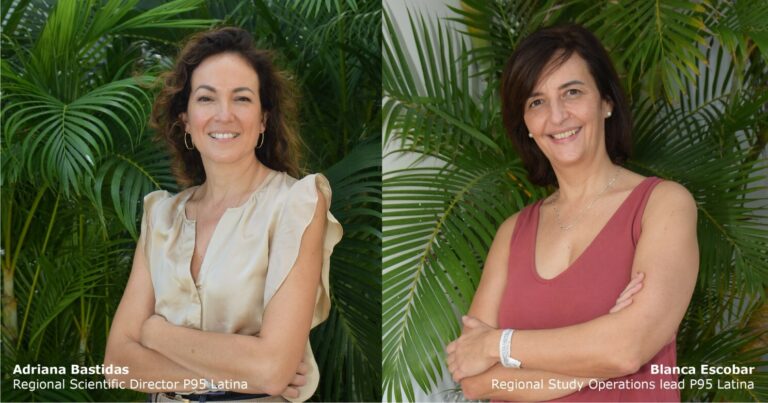“We saw in Latin America a hub of talented professionals in epidemiology and research”

Expanding to a different region is the dream of any growing company. For P95, the opportunity arose last year, when Adriana Bastidas, Regional Scientific Director and Blanca Escobar, Regional Study Operations lead, took on the challenge of creating P95 Latina, the first branch office of P95 outside Europe. Based in Colombia, where an important hub for clinical research and epidemiology in the region was identified, P95 Latina started operations in April 2021 and now counts with nine epidemiologists and one medical editor. In this interview, Adriana and Blanca explain the process of creating P95 Latina, its challenges, and its future.
Q: Why did P95 decide to expand to Latin America?
A: There were parallel interests that came together and created a perfect “symbiosis.” On the one hand, P95 had the idea of expanding to another geographic location to increase the geographic capacity in terms of projects and human resources. On the other hand, as Latin Americans with 20+ years of work experience in Europe, we wanted to take the skills and knowledge acquired to train people there and at the same time create work and development opportunities in the region, as well as link talented professionals with international epidemiological and clinical research companies and networks.
The idea of establishing a branch office in Latin America was a combination of both interests, and the decision to do it in Colombia was because we identified it as an important hub of talented professionals in epidemiology and public health. Clinical research centers in Colombia have shown significant development in the past 15 years and have become important for studies in Latin America and there is an open spirit to learn and further develop in epidemiology and clinical research. Also, Colombia has a large population (≈50 million people), regulations facilitate the establishment of foreign companies, and the country has had a very stable economy for more than two decades.
Q: How has the process of creating a new hub on the other side of the world been?
A: We started working with research centers and universities, which has been very interesting and enriching. It helped us confirm what we knew about Colombia: it is a country with a lot of interest in creating knowledge and professional networks. The researchers, professors, and coordinators have been very open and receptive to the idea and facilitated the process. In fact, they are very interested in a continuous collaboration.
Opening the branch in administrative and legal terms was also relatively easy. With the help of some personal contacts in Colombia and the Flanders Investment & Trade organization (FIT), we were quickly connected to several Colombian organizations, which facilitated many administrative aspects and decisions. Furthermore, Colombians are quite receptive towards development and business.
Q: What has been the most difficult and the most rewarding aspect of this process?
A: We have felt very welcome. The most rewarding thing has been identifying and creating a work team with very capable, committed professionals with a thirst for knowledge and progress. It has been especially gratifying to see how the group has integrated into P95 in such a short time, despite the distance and the challenges it poses. Also, it is encouraging to see all that has been done for research and training in epidemiology and clinical research in Colombia, resulting in leading study centers that know very well what they do (with international standards). There are many collaboration opportunities not only in the country but also in Latin America.
As there is so much potential for collaboration, perhaps a nice challenge rather than a difficulty (we see it as a luxury problem) is to identify the most efficient way to integrate local and regional project opportunities into the company’s short-term global strategy.
Q: How do you see the near future for the Latin American hub? Are there plans to expand to other countries in the region?
A: The hub in Colombia is called P95 Latina because, since its creation, the intention has been to have this location as a center for Latin America. The near future includes increasing professional capacity, deploying more epidemiological studies in the region, and creating new collaborations with universities and research centers in Colombia and across the entire region.